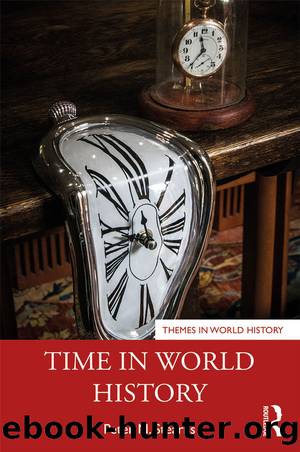Time in World History by Peter Stearns;

Author:Peter Stearns;
Language: eng
Format: epub
Publisher: Taylor & Francis (CAM)
Published: 2019-09-15T00:00:00+00:00
This chapter and the next cover what is sometimes called the âlongâ 19th century â from the late 18th into the early 20th. Like the previous period, these decades saw a number of crucial developments in the history of time â though they have, on the whole, won less attention from specialists in the subject. The big foci are, first, how industrializing societies both needed and facilitated new uses of time â the topic of this chapter, centered on Western Europe and the United States; and, second, how increasing global trade and contacts, largely under Western sponsorship in this imperialist age, generated change and resistance regarding the nature of time in other regions â the topic of Chapter 6.
As in the early modern period, developments centered particularly on clock time during the day and, increasingly, the night, though there were some global changes in accepted calendars. But even in the West, where the Gregorian calendar remained the common currency, some important shifts occurred in the conception of the week â most particularly the emergence of the modern weekend.
As to clock time, attention shifts away from basic technological advances, though there were a few, to the abundance of possibly painful adjustments in the ways ordinary people encountered time â at work, at play, in childhood, even in routine manners. While real questions remain about the extent of conversion to a modern time sense by 1800, for the bulk of the population, there are no doubts about 1900: clock time was everywhere. To be sure, most people, even in the West, did not yet have personal timepieces. And there were debates around the edges about the importance of great precision. It was around 1900 that a German military leader opined that âpractical life rarely demands a punctuality reckoned in minutesâ, noting that schools and courts often actually set clocks back so that attendees would not be declared late. But his nonchalance was answered by an official from the Berlin observatory, who insisted that timelines to the minute were a matter of basic courtesy. And even the general would not have disputed the fact that minutes, and certainly hours, half hours and even quarter hours had become steadily more important during his lifetime.
The key question is not the spread of the importance of clock time and devices to measure it, but the mixture of voluntary and compulsory incentives for change. It is abundantly clear, historically and as a matter of common sense, that clock time is not natural, but of human devising. As it became more ubiquitous in the Western world, could it be assimilated fairly readily or was it an unwelcome imposition? Answers depended greatly on social class â and related experience with clock time before the industrial revolution â and sometimes even on gender.
Download
This site does not store any files on its server. We only index and link to content provided by other sites. Please contact the content providers to delete copyright contents if any and email us, we'll remove relevant links or contents immediately.
| Africa | Americas |
| Arctic & Antarctica | Asia |
| Australia & Oceania | Europe |
| Middle East | Russia |
| United States | World |
| Ancient Civilizations | Military |
| Historical Study & Educational Resources |
Magic and Divination in Early Islam by Emilie Savage-Smith;(1197)
Ambition and Desire: The Dangerous Life of Josephine Bonaparte by Kate Williams(1087)
Operation Vengeance: The Astonishing Aerial Ambush That Changed World War II by Dan Hampton(986)
What Really Happened: The Death of Hitler by Robert J. Hutchinson(871)
London in the Twentieth Century by Jerry White(848)
Time of the Magicians by Wolfram Eilenberger(844)
Twilight of the Gods by Ian W. Toll(813)
The Japanese by Christopher Harding(803)
Papillon by Henry Charrière(796)
Lenin: A Biography by Robert Service(780)
The Devil You Know by Charles M. Blow(779)
Twelve Caesars by Mary Beard(769)
Freemasons for Dummies by Hodapp Christopher;(749)
The Churchill Complex by Ian Buruma(731)
Napolean Hill Collection by Napoleon Hill(706)
The Enlightenment by Ritchie Robertson(693)
Henry III by David Carpenter;(690)
Bohemians, Bootleggers, Flappers, and Swells: The Best of Early Vanity Fair by Bohemians Bootleggers Flappers & Swells- The Best of Early Vanity Fair (epub)(687)
The Rise and Triumph of the Modern Self by Unknown(659)
